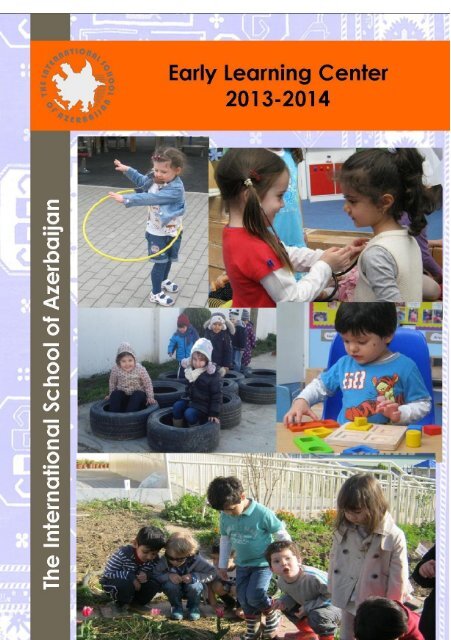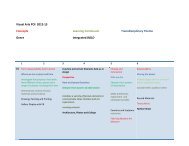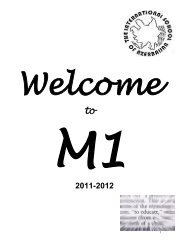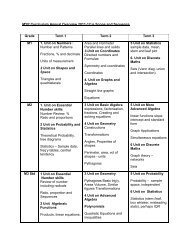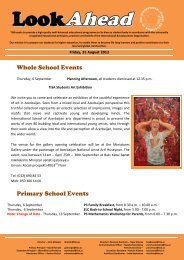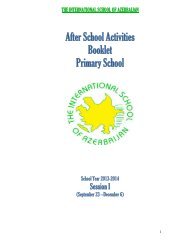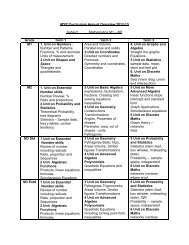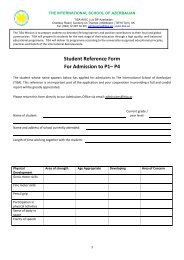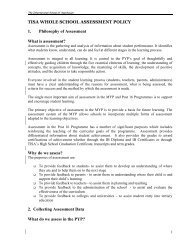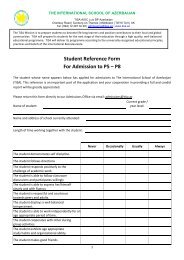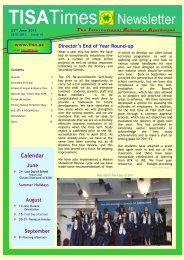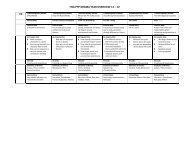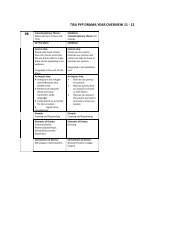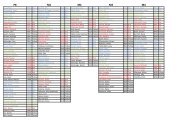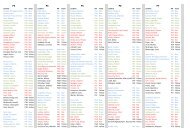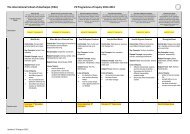What we believe Our mission
ELC Brochure 2013-14 (2).pdf - The International School of Azerbaijan
ELC Brochure 2013-14 (2).pdf - The International School of Azerbaijan
Create successful ePaper yourself
Turn your PDF publications into a flip-book with our unique Google optimized e-Paper software.
E L C<br />
T I S A<br />
<strong>What</strong> <strong>we</strong> <strong>believe</strong><br />
We <strong>believe</strong> that by encouraging children to explore their world through a rich<br />
variety of interesting and challenging experiences, they can construct their own<br />
learning, extend their understandings and develop skills. This approach will have<br />
a significant impact on their self-esteem and the development of positive<br />
attitudes. We value each child as an individual who learns in his/her own way<br />
and at his/her own pace.<br />
<strong>Our</strong> <strong>mission</strong><br />
The TISA Mission is to prepare students to become life-long learners and positive<br />
contributors to their local and global communities. TISA will prepare its students<br />
for the next stage of their education through a high quality, <strong>we</strong>ll-balanced<br />
educational programme. TISA will deliver its programme according to the<br />
universally recognised educational principles, practices and beliefs of the<br />
International Baccalaureate.<br />
We meet the <strong>mission</strong> in the ELC by:<br />
• employing qualified and experienced early childhood educators<br />
• maintaining a low student - teacher ratio in order to meet the individual<br />
needs of children as <strong>we</strong>ll as the needs of the group<br />
• building strong partnerships with parents to model mutual respect and shared<br />
responsibility<br />
• creating a warm, colourful and nurturing environment in which children can<br />
grow and develop<br />
• equipping our facility with a wide variety of developmentally appropriate<br />
materials and resources selected to foster the natural curiosity of children
A developmentally appropriate<br />
programme<br />
The emphasis in the ELC is on learning through play in an environment designed<br />
to encourage:<br />
• discovery<br />
• independence<br />
• social skills development<br />
by teaching children how to:<br />
• make choices<br />
• help themselves<br />
• take initiative<br />
• care and respond to the<br />
needs of others<br />
We provide children with a balance of child-initiated and teacher-facilitated<br />
activities. The program offers children a variety of choices. The classroom<br />
environment is ordered around units of inquiry which are interdisciplinary<br />
studies integrating areas such as:<br />
• exploration, discovery, investigation • play<br />
• physical education<br />
• language and literacy<br />
• art<br />
• mathematics<br />
• science<br />
• music<br />
• ICT learning<br />
The IB Primary Years Programme (PYP) provides the framework for our<br />
curriculum throughout the primary school. If you would like more information<br />
about the PYP at TISA, please refer to TISA’s Primary Years Programme Guide<br />
available from the school office or on our school’s <strong>we</strong>bsite at www.tisa.az<br />
All experiences are designed to provide dynamic, exciting opportunities for gross<br />
and fine motor skills development, and development of the five PYP<br />
transdisciplinary skills; social skills, communication skills, self-management skills,<br />
research skills and thinking skills.
The TISA ELC Facility<br />
Spacious central open areas for:<br />
• singing and music in combined groups<br />
• interaction bet<strong>we</strong>en P1 and P2 classes<br />
• engagement with all ELC staff<br />
• exciting play and developmental opportunities<br />
• detailed observation of all children by all staff<br />
Focussed learning areas for:<br />
• student-initiated activities<br />
• teacher-led activities<br />
Movement areas for:<br />
• specialist activities<br />
• gross motor skill activities<br />
Outside play area for:<br />
• gross and fine motor activities<br />
• active and quiet play groups<br />
Kitchen and dining room for:<br />
• children’s snack and lunch selection<br />
• food preparation by the children and adults<br />
• science and baking activities<br />
Practical information<br />
Dates<br />
The school year begins in August and ends in June. All important dates can be<br />
found on the school’s <strong>we</strong>bsite: www.tisa.az<br />
Entry ages<br />
Children in P1 must be three years of age by September 1st. Children in P2 must<br />
be four years of age by September 1st. All children must be toilet-trained prior to<br />
entry.
Daily schedule<br />
P1<br />
P2<br />
08:15 drop off 08:15 drop off<br />
08:30 morning meeting and<br />
classroom activities<br />
08:30 morning meeting and<br />
classroom activities<br />
09:45 snack time 09:10 snack time<br />
10:00 outdoor inquiry time 9:25<br />
10:00<br />
colour group time<br />
outdoor inquiry time<br />
10:30 singing 10:30 singing time<br />
10:45 inquiry time 10:45 inquiry time<br />
11:45 lunch 11:45 class time for reflection<br />
12:00 story time 12:00 lunch<br />
12:15 pick up 12:30 outdoor time<br />
13:00 small group time<br />
14:00 pick up<br />
Meals<br />
A morning snack of cheese, fruit and vegetables is provided for all students.<br />
Children choose from a varied lunch menu through the <strong>we</strong>ek. We ask that<br />
children do not bring food from home as <strong>we</strong> have children with serious food<br />
allergies.<br />
Language of instruction<br />
English is the language of instruction. <strong>Our</strong> teachers and assistants represent a<br />
variety of nationalities and many are fluent in two or more languages.<br />
We value our language-rich community and encourage parents to support their<br />
child’s mother tongue development at home.<br />
Pick up<br />
If your child is being picked up by an adult who is not on your pick-up list, please<br />
ensure that you have sent a written per<strong>mission</strong> note to your child’s homeroom<br />
teacher the previous day. The person picking up your child must be aware of the<br />
arrangements and should also communicate with the homeroom teacher.<br />
If your child needs to picked up early by a nanny or driver who is listed on your<br />
security form, please also ensure that you have sent written per<strong>mission</strong> to your<br />
child’s homeroom teacher the previous day.
Frequently asked questions<br />
<strong>What</strong> does my child have to bring to school on the first day?<br />
• a hat<br />
• a small backpack or a rucksack<br />
• two changes of clothes (including two pairs of under<strong>we</strong>ar and socks), to be<br />
kept in their backpack<br />
• indoor and outdoor shoes – they should be comfortable and practical. High<br />
heels and fashion shoes are not appropriate. All shoes should come with<br />
velcro fastenings so that your child can put them on independently<br />
• boots for gardening<br />
All items must be clearly labelled with your child’s name.<br />
<strong>What</strong> about water and food?<br />
Please do not send water and food to school. Water and healthy, nutritious<br />
snacks are available throughout the day. We have a strict nut-free policy as <strong>we</strong><br />
have children with life-threatening nut allergies in our school.<br />
Which clothes are suitable for ELC?<br />
Children should <strong>we</strong>ar comfortable clothes that do not restrict their movement or<br />
their choice of activities. Fastenings should make it easy for children to dress<br />
themselves. Children will be<br />
painting, gluing and generally<br />
getting grubby! Therefore,<br />
please send your child in<br />
working clothes. Dresses and<br />
skirts should not be long as this<br />
is dangerous when climbing.<br />
Outdoor shoes should be<br />
suitable for active play.<br />
<strong>What</strong> about sun safety?<br />
In ELC, <strong>we</strong> have adopted a slip, slop, slap policy. In other words, when outside,<br />
slip on a t-shirt, slop on some sun-cream and slap on a hat. Research has shown<br />
that there is a link bet<strong>we</strong>en exposure to sun in childhood and skin cancer as an<br />
adult. Shoulders are particularly vulnerable and should be covered, therefore<br />
spaghetti straps and vest tops are not suitable.
<strong>What</strong> are the school hours?<br />
Children should be dropped off bet<strong>we</strong>en 8:15am and 8:30am. It is important that<br />
children come to school on time. The first part of the morning is when the<br />
children discuss and plan what they will do for the day.<br />
• P1 children should be picked up at 12:15pm<br />
• P2 children should be picked up at 2:00pm<br />
How do I communicate with my child’s teacher?<br />
Teachers are available before and after school every day for a quick chat. If you<br />
wish to discuss an issue in more detail, then you should email your child’s<br />
teacher to make an appointment. (The teacher’s emails addresses are on the last<br />
page of this brochure).<br />
How does my child’s teacher communicate with me?<br />
• ELC newsletter approximately every eight <strong>we</strong>eks<br />
• parent information notice boards in the ELC foyer<br />
• parent information evenings and Round Table Meetings<br />
• parent/teacher conferences and written reports<br />
• celebrations of learning<br />
How do I find out more about the curriculum in ELC?<br />
Evidence of learning can be seen in the ELC foyer where displays around the ELC<br />
support the curriculum and reflect children’s learning. Information is also<br />
available on the school <strong>we</strong>bsite http://www.tisa.az/. Additionally an<br />
appointment can be made to discuss the ELC curriculum with our PYP<br />
Coordinator, Kate Benson.
<strong>What</strong> is meant by toilet training?<br />
Children must be able to go the toilet independently and without assistance.<br />
Can my child bring a toy to school?<br />
Children are not to bring toys to school as <strong>we</strong> cannot ensure that the toys do not<br />
get lost or broken during the school day.<br />
Can I send a birthday cake or birthday treats to school with my child.<br />
When recognising your child’s birthday at school, small birthday snacks are<br />
appreciated ho<strong>we</strong>ver, please ensure that snacks are easy to distribute (i.e.<br />
cupcakes) and adhere to the school’s ‘no nut’ policy. No commercially purchased<br />
cakes can be brought in to share with children. Please arrange a suitable time<br />
with homeroom teachers prior to their birthday if you wish to have a small class<br />
celebration.<br />
If my child has an older sibling in the primary school what can I do about pick<br />
up for the child in the ELC?<br />
You can use the afternoon club at BTK. Children are escorted safely there after<br />
school. This is available for both P1 and P2 children. Contact the ad<strong>mission</strong>s<br />
officer to discuss this.<br />
When will the children use the library in the ELC?<br />
The children will have library lessons with their homeroom teacher when they<br />
can choose a book, and an additional <strong>we</strong>ekly session with the teacher librarian.<br />
They each receive a library bag when they begin school. Please ensure they<br />
return their book, in its bag, to the homeroom in time for the next library lesson.<br />
When can parents use the library in the ELC?<br />
For parents the ELC library is open from 8:15am until 8:45am from Monday to<br />
Friday. Parents may have books issued by our library assistant Farida. These<br />
books are issued in the parent’s name as children borrow their own library book<br />
during their class library time.
Illnesses<br />
These tips can help you decide whether to keep your child at home:<br />
1. If your child complains of not feeling <strong>we</strong>ll but otherwise has no definite<br />
symptoms, your child can likely attend school. The school nurse will typically call<br />
you if something more develops. Be sure to contact your paediatrician if the<br />
complaints persist or other more definite sick symptoms develop.<br />
2. Fever is a symptom of illness and not an actual diagnosis. Fever usually<br />
indicates that the body is battling an infection. A child with a fever greater than<br />
100.5 degrees Fahrenheit or 38 degrees Celsius needs to stay home from school<br />
until the fever is gone for at least 24 hours. If the fever does not resolve in two to<br />
three days, or if your child appears sick with any fever, call your doctor to have<br />
your child evaluated.<br />
3. Many rashes will resolve spontaneously and are not reason alone to keep a<br />
child home from school. Any rash associated with symptoms such as trouble<br />
breathing or swallowing, fever, or ill appearance, should be evaluated by your<br />
physician. Rashes that are itchy or scaly may be contagious and should be<br />
evaluated before sending a child back to school.<br />
4. Cough alone may not prevent your child from attending school unless it is<br />
interfering with a child’s sleep or ability to participate in school activities. If the<br />
cough is productive and has phlegm or is associated with fever or trouble<br />
breathing, keep your child home from school and arrange to have the child seen<br />
by their paediatrician.<br />
5. Stool problems do sometimes require a child to stay home from school. This is<br />
especially true with diarrhoea where the stool frequency is often many times an<br />
hour. Diarrhoea that is bloody or associated with fever, abdominal pain, or<br />
vomiting should be evaluated by your doctor.<br />
6. A child with vomiting, with or without diarrhoea, needs to stay home from<br />
school. Your child can return to school when the symptoms have stopped and<br />
the child can tolerate a regular diet.<br />
7. Children can attend school with mild sore throats if no other symptoms are<br />
occurring. Any child with a sore throat associated with fever, vomiting,<br />
abdominal pain, or difficulty swallowing should be evaluated by a doctor before<br />
returning to school. Call your child’s school and ask if strep throat is going
around; if so, have your child tested. A child with a diagnosis of strep throat<br />
needs to stay out of school until on antibiotics for 24 hours.<br />
8. If your child appears really sick, keep your child home and arrange an<br />
evaluation by your doctor that day. If you can’t get through to your doctor and<br />
you are really concerned, either call to International SOS or bring your child to<br />
the nearest emergency room for evaluation.<br />
9. Call your doctor’s office for<br />
advice if you are not sure about<br />
your child’s condition or have<br />
questions about whether your<br />
child should stay home from<br />
school. International SOS has a<br />
service 24 hours a day, 7 days a<br />
<strong>we</strong>ek. So, even after hours, you<br />
will be able to reach someone<br />
for assistance.<br />
Many illnesses can be stopped<br />
before they spread by reminding everyone to practice frequent hand washing,<br />
blowing noses into tissues, covering mouths when coughing or sneezing, and<br />
asking other parents about sick symptoms in their kids before arranging play<br />
dates and carpools. If only it <strong>we</strong>re so simple – even the best hygiene practices<br />
can’t avoid the spread of all winter illnesses. Sometimes staying home is the only<br />
way to benefit our kids, our communities and ourselves.<br />
Special circumstances<br />
The exclusion criteria in this information are aimed at generally healthy children.<br />
Immunocompromised children with an excludable condition or exposure may<br />
need longer periods of exclusion, subject to recommendations by their health<br />
care provider(s).<br />
Period of exclusion<br />
Infected children should be excluded from school until they are no longer<br />
considered contagious which is mentioned under each disease. If a student does<br />
not respond to treatment for an excludable condition, the health care provider<br />
should review the case and suggest longer periods of exclusion.
Frequent hand washing is the most important technique for preventing the<br />
trans<strong>mission</strong> of disease. Proper hand washing requires the use of (liquid) soap<br />
and vigorous washing under a stream of temperate (warm), running water.<br />
• hands should be <strong>we</strong>t under running water before applying soap<br />
• hands should be washed vigorously for 15-30 seconds<br />
• particular attention should be paid to thumbs, fingernails and bet<strong>we</strong>en<br />
fingers. Rinse hands thoroughly.<br />
• hands should be dried thoroughly with a hand dryer or paper to<strong>we</strong>ls after<br />
washing<br />
Confidentiality<br />
School staff with knowledge of a person diagnosed with a notifiable condition<br />
may only release that information to others who are responsible for protecting<br />
the health of the public through control of disease or the people who may have<br />
had potential exposure and need medical surveillance. Additionally, schools are<br />
required to implement policies and procedures to maintain confidentiality of<br />
medical information possessed by the school.<br />
Disclaimer<br />
This article is for information only and should not be used for the diagnosis and<br />
treatment of medical conditions. All reasonable care has been taken in compiling<br />
the information but there is no warranty as to its accuracy. Consult a doctor or<br />
other health care professional for diagnosis and treatment of medical conditions.<br />
Suggested <strong>we</strong>bsite: http://kidshealth.org/
The ELC Team<br />
ELC Coordinator + P1 Team Leader<br />
P2 Team Leader<br />
ELC Administrative Assistant:<br />
Claudine Olver<br />
Anthony Hamblin<br />
Nigar Hasanova<br />
P1C – Gold Group<br />
P1CW – Purple Group<br />
P1S – Red Group<br />
P2L – Orange Group<br />
P2A – Yellow Group<br />
P2F – Green Group<br />
P2T – Blue Group<br />
Claudine Olver (olver_claudine@tisa.az)<br />
Anastasiya Vanina, Sabina Abdullayeva<br />
Chee Wan Yuen (yuen_cheewan@tisa.az)<br />
Aida Elkhanzade, Kamila Abilova<br />
Soraya Parkinson (parkinson_soraya@tisa.az)<br />
Nazira Kishiyeva, Amaliya Panahova<br />
Luda Volodko (volodko_ludmila@tisa.az)<br />
Pervin Kerimova, Madina Mustafayeva<br />
Anthony Hamblin (hamblin_anthony@tisa.az)<br />
Albina Gafurova, Nelly Khan<br />
Foster Itter (itter_foster@tisa.az)<br />
Sevda Rzayeva, Aynur Suleymanova<br />
Tara Greenall (greenall_tara@tisa.az)<br />
Nika Abbasova, Tarana Babayeva<br />
ELC Cleaning Staff:<br />
Nubar Aliyeva<br />
Yana Orujeva<br />
Svetlana Gozalova<br />
ELC Security Guard:<br />
Farid Talibov<br />
ELC security mobile phone number: 0502410537<br />
ELC security guard extension: 145<br />
ELC Office extension: 154


